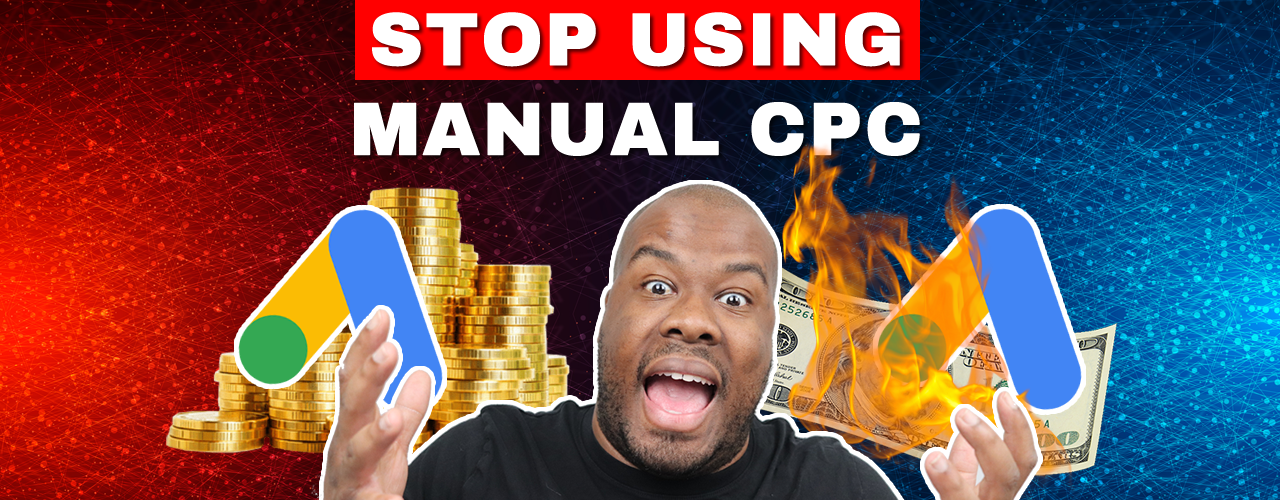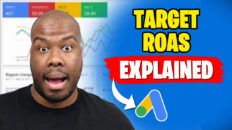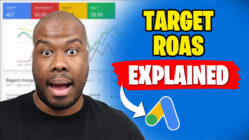Video Transcript
Today I’m speaking directly to you. Yes, you, the guy still using manual CPC like it’s 2015. What are you doing? If you’re stuck in the world of manual CPC or even enhanced CPC, then this video is specifically for you, because today what I’m going to show you is how to transition away from manual CPC over to a maximised conversions strategy with a target CPA.
to get better results than you could have ever hoped for with using a manual strategy. And I’m speaking from experience here. I have done this for so many clients and regardless of the size of the account, whether it’s a huge account spending thousands or an account spending just a few hundred pounds a day or whatever it might be.
This works. So let me walk you through my process. The first thing you need to do is get your head out of the manual CPC mode, because there are so many disadvantages to manual CPC. It’s unbelievable. First of all, you overpay and underpay for clicks, because of course if you’re entering an auction that’s really competitive with a really high conversion likelihood.
Your competitors on smart bidding are going to show for that search and if you’re on manual CPC You’ve capped the amount you’re willing to pay for that click meaning you could never be eligible for that particular high value search You can also overpay for clicks as well because if you’ve set a manual CPC with a maximum cap You’re literally saying to Google only pay this much for a click, but if that click is going to be useless Smart Bidding will adjust the bids down in order to make sure it meets your objective of hitting the target CPA.
So you’re going to also do that as well. The biggest disadvantage by far though about manual CPC is the fact that you’re not following how Google Ads actually works in the modern era. Google Ads is now not just about the search that the person is typing into Google, it’s also about the person behind the search.
What have they been doing? What behaviors have they been exhibiting? to make Google think they have a higher likelihood of conversion. If you’re using manual CPC, you don’t get any of these signals. You only get the signals you can see in your Google Ads account when you’re optimising. And that just doesn’t work as well.
So let’s get out of manual CPC mode and follow these six steps I’m going to show you in order to transition away from manual CPC for good. Number one, make sure your campaign budget is aligned with the goals you’re setting. If your CPA target is, say, 50 and your campaign budget is only 25, You’re not giving yourself the best opportunity for this to work.
If you’re doing this and running a manual CPC campaign, you’re basically limiting your volume and limiting the volume Google can go after. So if you’re going to set an objective for, say, 50 per conversion, make sure your daily spend can at least try and achieve one conversion per day. And of course, you have to be realistic.
You need to base your conversion target that you’re setting on recent performance. There’s no point in setting a conversion target too low because Google will simply not bid for it because it won’t be able to meet that criteria. So please be realistic when setting your conversion CPA targets. Point number two, you need to set the campaign up in line with how smart bidding works, which means if you’re using single keyword ad groups or really over the top themed ad group setups in terms of hundreds of ad groups with very few keywords in, that’s not setting you up for the best success for smart bidding because you need data to go through all of those ad groups and through all of those ads.
to make sure that Google can understand how people are interacting with them, it gets better data and can optimize faster. So if you’re using a single keyword ad group, also known as a SKAG setup, Then just stop doing it. You need to revert back to a more simplified setup to allow the smart bidding to work.
Number three, open up your match types. Now, I don’t mean just going for broad match. I can understand you’d be hesitant to do so and broad match doesn’t work all of the time. But do you know what does? Not using only exact match. Ever since Google changed exact match to close variants, people who are really focused on the keyword relevancy to the search term and making sure their traffic is what they think is hyper relevant by using manual CPC.
Some people are using exact match for all of their keywords to guarantee that the search term that’s being typed in is relevant, which sounds like a good idea on the face of it. But you see the problem is you’re limiting Google’s ability to find conversions. It’s too constrained. It can’t go outside the box because you’ll be very surprised to see the types of search term people are typing into Google.
to find your products and services. And the intent behind the person searching is becoming more and more important, as I say, than the actual keyword itself. So you need to stop limiting your setup with exact match only if you are doing that. Then point number five, following on from that, is to make sure that you’re not too aggressive with your negative keywords either, for exactly the same reason.
If Google is looking at the intent of the person searching nearly as much as the keyword, then it’s important not to limit Google’s ability to do that. Because, if you’re setting up really, really constrained negative keywords with a manual, CPC setup, then what’s going to happen when you transition to smart bidding is you’re just not going to find the conversions because the benefits of smart bidding, of finding that intent, you’re actually blocking Google from doing so.
That doesn’t mean to go crazy by the way. You can still obviously make sure you’re getting relevant traffic and adding negative keywords, but just be very careful with how many you’re adding and how close the negative keyword theme is to the core theme. of what you’re doing. If there’s a slight discretion, you might want to pull back a little bit just to give Google enough room to find the conversions it needs.
Next, what you want to do is set up a target CPA in line with your current performance using manual CPC because Google is going to transition from using your manual bidding over to smart bidding where it has more signals.
But to give it the best chance of succeeding, give Google enough of a chance to meet your current performance levels with manual CPC because it will ultimately do this because it’s basically hitting the bare minimum using no additional signals from any users.
It should hit this quite comfortably. But what you’re doing is giving Google a chance to just hit targets because that’s your target You’ve been running it with your manual CPC campaign Just give smart bidding a chance to equalize it and that will basically help Google learn and understand how to find conversions in line with your expectations.
Then finally when Google is actually hitting that target, and it will, even though the initial stages might be a little bit rocky, you might see a decrease in performance initially, just to set expectations, you know, it can happen.
But after 30 days, at least 30 days of time, Google will eventually hit that target. And then what you can finally do is start to push Google. You can start to lower that CPA target and watch Google outperform your manual CPC setup. It will eventually do this and I’ve not seen a scenario yet with any clients where I’ve moved them from manual over to smart bidding and it’s not worked yet.
There is one teeny tiny little caveat and don’t get excited because the solution isn’t manual CPC. You need to get rid of that strategy altogether. get it out of your head. What I will say is if you’re running a campaign where you have only maybe one or two or maybe three keywords that drive basically all of the activity, or should I say one or two or three search terms driving everything, then you want to maximize those terms.
And by going to a target CPA strategy, Google will eventually understand that those terms are driving everything. But If you really wanted to maximise things further, you could potentially use a max clicks strategy against one keyword or maximise impression share in terms of setting a 100 percent impression share for that one keyword.
That could be a provision, potentially, where you don’t have to use target CPA. But they’re still smart bidding strategies, so either way, you’re going to have to stop using manual CPC. Look, I didn’t make this video to shame anybody using manual CPC. It used to be a strategy I loved, and it’s kind of the lifeblood of Google Ads as we knew it back then.
But things have changed now, and what I want to do is challenge you to try and move with that change, because eventually Google will get rid of manual CPC. They’ve already got rid of enhanced CPC for shopping campaigns. They’ve done a lot of things on the platform around automation, moving away from manual controls.
You know this, I know this, you know the direction Google are heading in, so do I. So it makes sense to do things on your terms. Don’t wait till you’re pushed, take the leap and bring your parachute. Don’t just jump and then wait for Google to catch you. do these things yourself because it’s going to help you get better performance anyway.
But what do you think? Are you still using manual CPC? Let me know in the comments if you’re a diehard manual CPC fan or if you’re terrified of transitioning to a smart bidding strategy. I reply to all comments on all of my new videos. If you like this video, please give it a like below and then also head over to darren-taylor.com. If you want to work with me on your PPC campaigns and maybe I can transition you. Onto smart bidding as well. I’ll see you guys on the next video.







